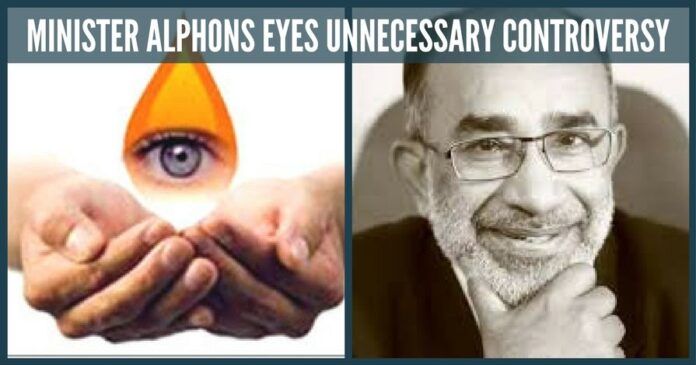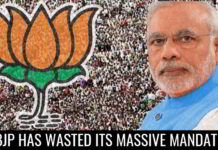
I will write to the [Health] Ministry to consider making eye donation compulsory,” Alphons told TOI.
Kahlil Gibran’s prophet told the people of Orphalese, “Your children are not your children,” and enlightened them how children “are the sons and daughters of Life’s longing for itself.” Congress president Sonia Gandhi told the captains of Indian industry, “Your conscience is not your conscience,” and went on making corporate social responsibility funding mandatory. The Narendra Modi government revealed its attitude in the Supreme Court in the privacy case when it told citizens, “Your bodies are not your bodies.” Most of the time governments in India lie; in this case, however, it was speaking the truth. Tourism minister K.J. Alphons surely wants to act on the belief of his government.
So, on Tuesday, he proposed that the government make eye donations compulsory for all Indians. “Making a case for cornea donation to help those blinded by corneal diseases, Alphons said he would formally write to the Union Health Ministry to make eye donations compulsory for all persons after they die,” reported The Times Of India (October 11). “Despite awareness programmes, only 45,000 Indians donate their eyes annually. A simple corneal transplant has the power of saving people from blindness. I will write to the [Health] Ministry to consider making eye donation compulsory,” Alphons told TOI.
Even if the government passes a law to make eye donation compulsory, it would be unconstitutional.
Why is it that ‘compulsory,’ ‘mandatory,’ and ‘ban’ have become the keywords in this government’s parlance? Persuasion, freedom of belief, and voluntary action—not coercion, forced belief, and compulsion—are some of the defining features of a liberal democracy. Democracy is not just about voting once in a while but about the individual let believe, say, and do whatever he wants to believe, say, and do so long as he doesn’t end up harming others. If people can be influenced by awareness programmes about organ donation, or any other altruistic activity, it’s very good; but forcing them to donate their eyes or other organs is undemocratic and illiberal.
Ashok Agarwal, an advocate in Delhi High Court who has donated his body to AIIMS Delhi for clinical research purpose after his death, told the news Firstpost that the Minister’s wish, though well-intentioned, cannot be implemented due to constitutional reasons.
“The Constitution of India provides us complete right to our body under the Fundamental Right to Privacy. So, it is the individual concerned and none other can decide about his or her body,” he said. Therefore, even if the government passes a law to make eye donation compulsory, it would be unconstitutional, the lawyer said.
There are fewer organ transplants from deceased people in Muslim-majority countries, compared with the rest of the world.
Further, the death of a human being doesn’t mean the end of everything related him—his wishes, ideas, ideals, values, etc. For instance, Dev Anand (1923-2011), the evergreen Hindi film star known for good looks and flamboyance, didn’t want even his body to be shown to the public. Sadhana (1941-2015), the beautiful actress of yesteryears, suffered from thyroid problems and didn’t want to be photographed in her later years; she wanted people to remember her when she was at the peak of youth and fame. Shouldn’t the privacy of such people be respected?
Then there are religious issues. A large section of Muslims thinks that organ donation is against their faith. According to the Global Observatory on Donation and Transplantation, there are fewer organ transplants from deceased people in Muslim-majority countries, compared with the rest of the world. Which means that mandatory eye donation would unnecessarily infuriate the country’s largest minority community. Many Hindus, too, are not favourably disposed towards the idea of organ donation.
If awareness programmes in India are ineffective, efforts should be made to make them effective. Such efforts are on in the UK to convince Muslims to donate organs posthumously. What is needed in our country is persuasion, not compulsion.
Note:
1. The views expressed here are those of the author and do not necessarily represent or reflect the views of PGurus.
- Liberty Is Penalized, Violence Goes Untouched - December 21, 2019
- Rahul’s Howdy bloomer - September 22, 2019
- Chidambaram’s hypocrisy - August 22, 2019











I agree with the author. It should voluntary.
The reason for such a low enrolment for eye donation is lack of awareness, inertia and the need for a lot of effort on the part of willing donors.
There are simple ways to enrol lakhs of donors with just a little effort.
For example, if the Government gives a mobile number that is easy to remember (like 94444) and asks people to give a missed call to that number to agree to donate their eyes, and propagate it through a few simple WhatsApp messages (some as text, some as images of celebrity volunteer ambassadors incl the PM himself), we will have the mobile number ringing continuously. It should NOT BE TOLL-FREE numbers with automated enrolment, which will be a deterrent.
Then those who enrolled can be contacted to confirm and their address collected, and the nearest Eye Hospitals can be asked to complete the formalities.
Subsequently, the enrolled donors can be sent a Printed Cand and a Sticker with the signature of the PM in print. The Hospital can, with the permission of the donor, stick the Sticker at the door or in a prominent place in the House. It can be something to the effect: “Mrs. XXXXXX residing here at yyyyyyy is an Eye Donor. Are You? Please five a missed Call to 94444 and enrol today!”
All this won’t cost a lot of money and won’t take a lot of effort.
It is the inertia and the process of donation that makes few people enrol. If the Govt gives a Mobile no & says those who are willing to donate can give a missed call to that no, the call will be duly returned later and the process of donation completed, many more will enrol.
Whatsapp can be used to propagate the message.
In fact later, the same idea can be used for donation of other organs.